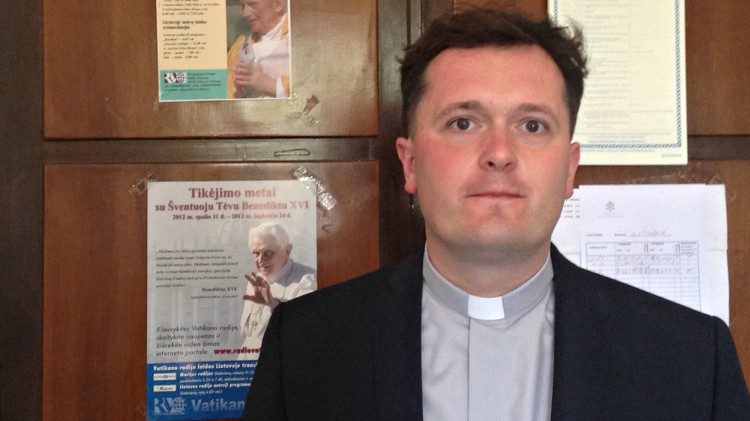Bergoglio in the Baltic States/1
Next September the Pope will visit the three Balkan States. He will travel to Lithuania first, and then he will continue to Estonia and Latvia. The Deputy-Secretary General of the Bishops’ Conference told SIR about the expectations and the preparations for the Pontiff’s arrival twenty-five years after the historic meeting with John Paul II, on the aftermath of the recovery of freedom following the collapse of the USSR. It is a faith made of tradition, combined with secularization. Young people are “an encouraging sign”

Lithuania is the first destination of Pope Francis’ apostolic visit to the Baltic States. Twenty-five years after John Paul II a Pope will return to visit these lands. It was September 1994, and it will be September also for Francis. John Paul II’s remained from September 4 to 10, Francis will be in this stretch of land in Northern Europe that is very close to Russia, from September 22 to 25. “When John Paul II visited Lithuania in 1994, he spoke at length about our past: in 1990 we had declared independence from the Soviet Union, after 50 years. During his visit the Pope said we had to accept our past, reflect on it, pray, but he also said to embrace the wounds of our history. Now Pope Francis will talk to us about the future, perhaps he will tell us to stop thinking about the past, to focus on the present and on the future”, Fr Mykolas Sotničenka, Deputy-Secretary General of the Bishops’ Conference, in charge of university pastoral ministry, ecclesiastical notary, said in an interview with SIR. He explained the motto of the visit, “Jesus Christ, our hope”: “Lithuania is a country without hope and we need a great amount of hope; that is why we are intensely preparing ourselves, and the whole program will revolve around how to increase hope.” What are the signs of this “desperation”? “The number of suicides, for example, is the highest in Europe”; moreover, a large number of Lithuanians are leaving the Country, “they go to Norway, to the United Kingdom, in search of a job.” “The Pope is not visiting Lithuania by a mere coincidence, but because Lithuania needs this visit and the Pope knows that it’s necessary.”
Faith and tradition. Yet Lithuania is the most Catholic of all Baltic Countries. Catholics account for 95 per cent of the nation’s 3 million inhabitants. However, “it could be best described as a Catholicism by tradition. Everyone wants to get married in Church, they baptize their children and they have them make the first Communion. But that is all. There’s nothing more. Practising Catholics, who go to Mass every Sunday, are approximately 10%.” Young people are an encouraging sign. Fr Mykolas said, “it might seem unusual, but we have large groups of parishioners and youth groups. In the parishes there are more youths than old people. Today they represent our hope: they have solid roots and they grow up as authentic Catholics who go to Church not by tradition but because they believe it.” The Pope will be meeting them on September 22 on the Square of Vilnius’ Cathedral and will listen to their testimonies, “then together we will sing ancient chants and will join in a modern dance. After that the Pope will deliver his address to young people. He will be with them approximately one-and-a-half hours.” Young people are invited to attend the Holy Mass in Kaunas, the next morning, on September 23, thus we are organizing hospitality for them in the schools of Kanaus.
 An intense program. Before meeting young people, immediately after his arrival in Vilnius, the Pope will meet the President of the Republic Dalia Grybauskaitė and the Diplomatic corps. “The Pope’s visit to Lithuania is both pastoral and political”, and it has a special connotation since “this year marks the 100th anniversary of the Country’s independence in 1918”. After the State meetings the Pope will visit “our Marian shrine dedicated to Our Lady of the Gates of Dawn, where he will pray, he will meet the sick and children, he will say the rosary”, then on the square he will experience the meeting with the young. The next morning he will celebrate Mass in Kaunas, he will meet the bishops, priests and seminarians, and will return to Vilnius to stop once again at the Museum of the victims of Occupation, in what once was the seat of the KGB.
An intense program. Before meeting young people, immediately after his arrival in Vilnius, the Pope will meet the President of the Republic Dalia Grybauskaitė and the Diplomatic corps. “The Pope’s visit to Lithuania is both pastoral and political”, and it has a special connotation since “this year marks the 100th anniversary of the Country’s independence in 1918”. After the State meetings the Pope will visit “our Marian shrine dedicated to Our Lady of the Gates of Dawn, where he will pray, he will meet the sick and children, he will say the rosary”, then on the square he will experience the meeting with the young. The next morning he will celebrate Mass in Kaunas, he will meet the bishops, priests and seminarians, and will return to Vilnius to stop once again at the Museum of the victims of Occupation, in what once was the seat of the KGB.
“Looking the Pope in the eye.” A group of ten people are working on the details of the programme. From August 1st it will be possible to book the tickets for the meeting with young people in Vilnius and for the Mass at Santakos Park in Kanaus. “We often said that we don’t know how many people will be coming and we don’t intend to either”, Fr Mykolas said with a smile. “Our wish – this is our message to the Lithuanian people – is that the meeting with the Pope may be personal, and that’s why we have been telling the faithful in dioceses and parishes that they must attend the events in person and that they should not be content with seeing the Pope on TV for fear of the crowds.” “We also have a request: don’t bring your mobile phones during the meeting: you have to look the Pope in the eye. Even if it should last a second, it will be a personal encounter”, he concluded.